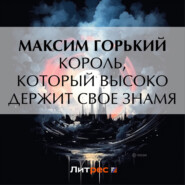По всем вопросам обращайтесь на: info@litportal.ru
(©) 2003-2024.
✖
The Man Who Was Afraid
Настройки чтения
Размер шрифта
Высота строк
Поля
“I cannot drink, I cannot eat.”
Trembling in every limb, the woman sobbed out tremulously, with strange sadness:
“Wine cannot gladden my soul.”
The peasant smiled sweetly, tossed his head to and fro, and closing his eyes, poured out into the air a tremulous wave of high-pitched notes:
“Oh, time has come for me to bid goodbye!”
And the woman, shuddering and writhing, moaned and wailed:
“Oi, from my kindred I must part.”
Lowering his voice and swaying to and fro, the peasant declaimed in a sing-song with a remarkably intense expression of anguish:
“Alas, to foreign lands I must depart.”
When the two voices, yearning and sobbing, poured forth into the silence and freshness of the evening, everything about them seemed warmer and better; everything seemed to smile the sorrowful smile of sympathy on the anguish of the man whom an obscure power is tearing away from his native soil into some foreign place, where hard labour and degradation are in store for him. It seemed as though not the sounds, nor the song, but the burning tears of the human heart in which the plaint had surged up – it seemed as though these tears moistened the air. Wild grief and pain from the sores of body and soul, which were wearied in the struggle with stern life; intense sufferings from the wounds dealt to man by the iron hand of want – all this was invested in the simple, crude words and was tossed in ineffably melancholy sounds toward the distant, empty sky, which has no echo for anybody or anything.
Foma had stepped aside from the singers, and stared at them with a feeling akin to fright, and the song, in a huge wave, poured forth into his breast, and the wild power of grief, with which it had been invested, clutched his heart painfully. He felt that tears would soon gush from his breast, something was clogging his throat and his face was quivering. He dimly saw Sasha’s black eyes; immobile and flashing gloomily, they seemed to him enormous and still growing larger and larger. And it seemed to him that it was not two persons who were singing – that everything about him was singing and sobbing, quivering and palpitating in torrents of sorrow, madly striving somewhere, shedding burning tears, and all – and all things living seemed clasped in one powerful embrace of despair. And it seemed to him that he, too, was singing in unison with all of them – with the people, the river and the distant shore, whence came plaintive moans that mingled with the song.
Now the peasant went down on his knees, and gazing at Sasha, waved his hands, and she bent down toward him and shook her head, keeping time to the motions of his hands. Both were now singing without words, with sounds only, and Foma still could not believe that only two voices were pouring into the air these moans and sobs with such mighty power.
When they had finished singing, Foma, trembling with excitement, with a tear-stained face, gazed at them and smiled sadly.
“Well, did it move you?” asked Sasha. Pale with fatigue, she breathed quickly and heavily.
Foma glanced at the peasant. The latter was wiping the sweat off his brow and looking around him with such a wandering look as though he could not make out what had taken place.
All was silence. All were motionless and speechless.
“Oh Lord!” sighed Foma, rising to his feet. “Eh, Sasha! Peasant! Who are you?” he almost shouted.
“I am – Stepan,” said the peasant, smiling confusedly, and also rose to his feet. “I’m Stepan. Of course!”
“How you sing! Ah!” Foma exclaimed in astonishment, uneasily shifting from foot to foot.
“Eh, your Honour!” sighed the peasant and added softly and convincingly: “Sorrow can compel an ox to sing like a nightingale. And what makes the lady sing like this, only God knows. And she sings, with all her veins – that is to say, so you might just lie down and die with sorrow! Well, that’s a lady.”
“That was sung very well!” said Ookhtishchev in a drunken voice.
“No, the devil knows what this is!” Zvantzev suddenly shouted, almost crying, irritated as he jumped up from the table. “I’ve come out here for a good time. I want to enjoy myself, and here they perform a funeral service for me! What an outrage! I can’t stand this any longer. I’m going away!”
“Jean, I am also going. I’m weary, too,” announced the gentleman with the side whiskers.
“Vassa,” cried Zvantzev to his lady, “dress yourself!”
“Yes, it’s time to go,” said the red-haired lady to Ookhtishchev. “It is cold, and it will soon be dark.”
“Stepan! Clear everything away!” commanded Vassa.
All began to bustle about, all began to speak of something. Foma stared at them in suspense and shuddered. Staggering, the crowd walked along the rafts. Pale and fatigued, they said to one another stupid, disconnected things. Sasha jostled them unceremoniously, as she was getting her things together.
“Stepan! Call for the horses!”
“And I’ll drink some more cognac. Who wants some more cognac with me?” drawled the gentleman with the side whiskers in a beatific voice, holding a bottle in his hands.
Vassa was muffling Zvantzev’s neck with a scarf. He stood in front of her, frowning, dissatisfied, his lips curled capriciously, the calves of his legs shivering. Foma became disgusted as he looked at them, and he went off to the other raft. He was astonished that all these people behaved as though they had not heard the song at all. In his breast the song was alive and there it called to life a restless desire to do something, to say something. But he had no one there to speak to.
The sun had set and the distance was enveloped in blue mist. Foma glanced thither and turned away. He did not feel like going to town with these people, neither did he care to stay here with them. And they were still pacing the raft with uneven steps, shaking from side to side and muttering disconnected words. The women were not quite as drunk as the men, and only the red-haired one could not lift herself from the bench for a long time, and finally, when she rose, she declared:
“Well, I’m drunk.”
Foma sat down on a log of wood, and lifting the axe, with which the peasant had chopped wood for the fire, he began to play with it, tossing it up in the air and catching it.
“Oh, my God! How mean this is!” Zvantzev’s capricious voice was heard.
Foma began to feel that he hated it, and him, and everybody, except Sasha, who awakened in him a certain uneasy feeling, which contained at once admiration for her and a fear lest she might do something unexpected and terrible.
“Brute!” shouted Zvantzev in a shrill voice, and Foma noticed that he struck the peasant on the chest, after which the peasant removed his cap humbly and stepped aside.
“Fo-o-ol!” cried Zvantzev, walking after him and lifting his hand.
Foma jumped to his feet and said threateningly, in a loud voice:
“Eh, you! Don’t touch him!”
“Wha-a-at?” Zvantzev turned around toward him.
“Stepan, come over here,” called Foma.
“Peasant!” Zvantzev hurled with contempt, looking at Foma.
Foma shrugged his shoulders and made a step toward him; but suddenly a thought flashed vividly through his mind! He smiled maliciously and inquired of Stepan, softly:
“The string of rafts is moored in three places, isn’t it?
“In three, of course!”
“Cut the connections!”
“And they?”
“Keep quiet! Cut!”
“But – ”
“Cut! Quietly, so they don’t notice it!”

















